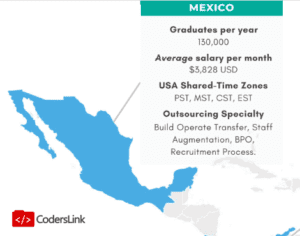
Mexico’s tech ecosystem is a fast-growing and viable dark horse in the world of innovation and startups. While companies outsourced and hired remote software developers across the pond in India and Eastern European regions, Latin America (LATAM) cultivated a fertile tech culture right under America’s nose. Leading in the region is America’s closest southern neighbor, which embraced opportunities presented with nearshoring and remote work to foster a growing network of tech talent eager to tackle technology’s biggest challenges.
Mexico’s tech hubs have caught the eye of big companies, mid-size enterprises, and startups seeking to scale their teams, cut costs, and boost productivity and development.
Here’s why Mexico has the competitive edge.
Notable Changes in Mexico’s Tech Industry in Recent Years
An ecosystem— in the business sense of the word— is a network of independent entities that operate in the same space to foster new ideas. It is a diverse self-feeding system: as companies set up shop, it spurs competition and engagement, which drives production and creativity. This, in turn, drives interest, investment, talent, and growth. In Mexico’s tech sector, this chain of events has been happening for years as companies, venture capitalists, and other investors place their support behind the evident startup potential in the region.
Since the pandemic, this type of investment in Latin America has only accelerated. Recent reports in Bloomberg Linea, for example, suggest that even despite economic downturns, VC funds remain optimistic about the Latin American tech startup boom.
Big companies like Google, Pinterest, LinkedIn, and Uber have also established offices in Mexico or expanded teams using Mexican software developers.
Why Mexico is Turning Company Heads and Attracting Investment
Based on CodersLink’s independent research, we know that more than 130,000 tech graduates receive diplomas every year. In the last five years alone, Mexico became an outsourcing hotspot— home to several tech hubs bustling with computer science engineers and recent graduates.
Top tech cities in Mexico include Mexico City, Monterrey, Guadalajara, Queretaro, and Merida.

Hiring remote software developers in Mexico means:
- Reduced costs: With a cost of living 300% less than in the United States, Mexico software developers receive a handsome salary in their country at 40-60% less than developers in the U.S.
- Proximity to the U.S. Keeping your tech team close is valuable to tech teams working on complex and massive projects. With more than 300 flights between the two countries, all of which are less than 3 or so hours, occasional face-to-face meetings are a possibility.
- Shared time zones. Complications and slowed communications are much more common when people are hours apart. Distant time zones have the tendency to stagger production schedules and dwindle collaboration.
- USMCA-encouraged trade. The United States-Mexico-Canada Agreement has strong built-in protections for intellectual property and encourages collaboration and trade across borders. With an increasingly volatile geopolitical climate, favorable trade terms give investors peace of mind and security.
- High English fluency. Mexican software engineers have a high English fluency rate. About 45-50% of the IT population has an advanced English level and 35-40% have an Intermediate level. Our survey results showed that professionals with an advanced level of English earn 115% more than those with an intermediate level.
The Age of Remote Work and Flexible Work Reaches Mexico
The United States was not the only country that shifted towards a work-from-home model during the pandemic. The spread of COVID-19 profoundly impacted the way people think about work across the board. As the pandemic waned, about 90% of professionals in Mexico who worked from home during 2020-2021 stated they did not want to return to the office.
The shift to remote work set in motion a transition into a new work paradigm that allows and encourages diverse teams working across borders, digital nomads setting up laptops on beachfronts, and workers adapting to flexible work-from-home schedules.
In Mexico, this shift to more remote work opened up opportunities for flourishing software developers to work for international companies without having to relocate. The tech talent across Mexico is seizing those opportunities and hungry for the prospect of working on exciting projects without having to pack up their families and move.
At the same time, 60% of IT professionals in Mexico consider a home office the main selling point of job flexibility.
Mexico’s Competitive Edge: Salaries and Seniority
The difference in cost of living reflects considerably on the expected salaries of Mexican developers. A 2020 Deloitte survey suggested that cost reduction was the top priority for organizations. Similarly, the demand for flexibility was equally important as businesses are pressured to push the boundaries of innovation.
With Mexico’s lower cost of living and tech talent surplus, there is high potential for investment in a booming ecosystem with a high return.
Key Factors & Average Salaries of Mexican Software Developers
The average salary of a mid-level developer in Mexico is $3,981 USD. With this rate, a Mexican software developer earns an excellent salary that provides them a salary surplus of about 62% in Mexico City, which has the highest cost of living in the country. In comparison, the average tech worker in the U.S. takes home about $92,000 a year.
Experience is a major factor when it comes to salaries. In Mexico, seniority makes a big difference in pay. Engineers with 5-8 years of experience earn up to 40% more. Generally, in the United States, companies categorize developers into three major categories: Junior, Intermediate, and Senior. In our report, we broke down the categorizations as follows:
| Junior | Intermediate | Senior | Senior advanced |
| 1-4 | 5-8 | 9-10 | 11+ |
Mexican Software Developer Salaries by Role
Salaries also vary significantly by role. The average salary for IT professionals in Mexico is $3,828 USD compared to $7,000 in the United States. Other average salaries include:
- Chief Technology office of $9,300
- Chief Product Officer with an average salary of $7,915
- Engineering Manager with an average salary of $5,986
Our report also breaks down remote software developers’ salaries based on location and experience levels.
Download the FULL TECH SALARIES REPORT and dive further into key insights of Mexico’s tech industry.
CodersLink has established networks of software developers in Mexico— a talent pool of about 20,000 skilled workers— to connect companies with the right candidate. Our 2022 Tech Salaries Report details key trends in the Mexico tech ecosystem, salary comparisons in Latin America, and Mexico’s hiring landscape.
Connect With the Best Developers in LATAM and Tap Into Mexico’s Cutting-Edge Tech Talent
CodersLink published the Tech Salaries Report 2022, compiled from survey data, job position information from more than 150 partners, and data from our very own engineering community, developers, and professionals.
With the leading end-to-end management platform and established talent networks on the ground, CodersLink connects innovative companies with talented developers in Mexico. Ready to get started with your new talented team? Connect with us today.


